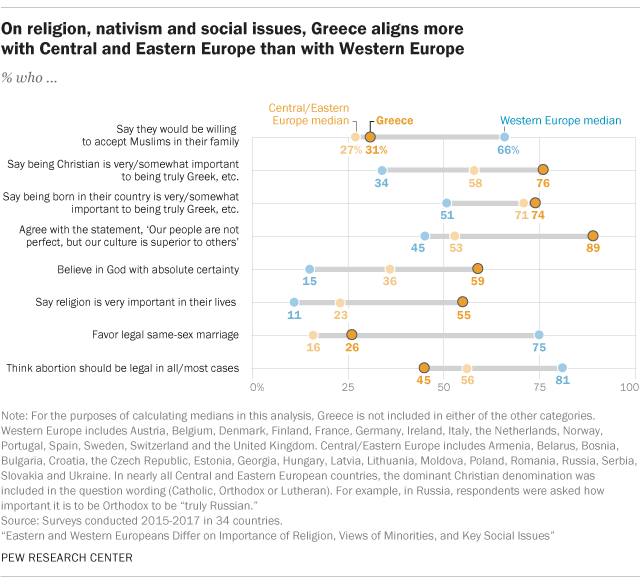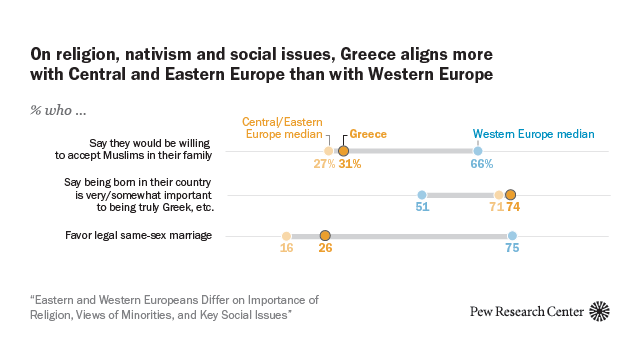Politically, Greece has long been aligned with the West. It joined NATO in 1952 and the European Union in 1981, and unlike almost all of its southeastern European neighbors, it remained outside the Soviet sphere of influence during the Cold War.
When it comes to public attitudes toward religion, national identity, and the place of religious minorities, Greeks, like their eastern neighbors, hold more nationalist and less tolerant views than Western Europeans, according to a new study. Pew Research Center Analysis surveys in 34 countries across the continent. The Greeks seem to recognize it: seven out of ten agree with the statement“There is a conflict between the traditional values of our country and those of the West.” And a majority of Greeks have at least some affinity with Russia: seven out of ten adults say a strong Russia is needed to balance the influence of the West.
 Greece is a majority Orthodox Christian nation – as are Russia, Ukraine and other Eastern European countries. And, like many Eastern Europeans, Greeks view Christianity as a key part of their national identity. Three-quarters of Greeks say that being Orthodox is at least somewhat important to being truly Greek; Many other Central and Eastern Europeans link religion and nationality in this way (median 57%), while fewer Western Europeans do so (median 34%). Additionally, about a third of Greek adults say they would be willing to accept Muslims (31%) or Jews (35%) into their family, a percentage similar to other Central and Eastern European countries, but well below average. actions that express acceptance of religious minorities in Western Europe.
Greece is a majority Orthodox Christian nation – as are Russia, Ukraine and other Eastern European countries. And, like many Eastern Europeans, Greeks view Christianity as a key part of their national identity. Three-quarters of Greeks say that being Orthodox is at least somewhat important to being truly Greek; Many other Central and Eastern Europeans link religion and nationality in this way (median 57%), while fewer Western Europeans do so (median 34%). Additionally, about a third of Greek adults say they would be willing to accept Muslims (31%) or Jews (35%) into their family, a percentage similar to other Central and Eastern European countries, but well below average. actions that express acceptance of religious minorities in Western Europe.
Religion is also more important in the personal lives of Greeks than in those of many Western Europeans. Nine in ten Greeks (92%) believe in God – 59% of whom say they believe with absolute certainty – while a median of just 15% of Western Europeans say they are certain of God’s existence. And 55% of Greek adults say religion is very important in their lives – more than double the proportion who say this in Ireland, Italy and Spain, and five times the proportion in France, Germany and the UK. United. Greece is also more religious than most Central and Eastern European countries in terms of these measures.
Partly related to higher levels of religious observance, Greeks are much more opposed to legal same-sex marriage and abortion than Western Europeans. Seven in ten Greeks oppose or strongly oppose allowing gays and lesbians to marry legally – a perspective shared by virtually all Central and Eastern European countries surveyed – while majorities in 15 Western European countries surveyed service same-sex marriage. And Greeks are divided on whether abortion should be legal or illegal (45% versus 52%), while majorities across Western Europe support legal abortion.
Like Russians, Poles and people from other Central and Eastern European countries, most Greeks say it is important to be born in their country (74%) and to have a family history there (85%) to be truly Greek. perhaps suggesting that immigrants cannot truly belong. Far fewer Western Europeans share this view. Furthermore, a large majority of Greek adults say their culture is superior to others – similar to the proportions of adults who say this in Georgia and Armenia, but much higher than those in most countries on the continent.
Of course, Greece does not align on all issues with its neighbors in Central and Eastern Europe. Ancient Greece is called a few times the birthplace of democracy, and 77% of Greeks say democracy is preferable to any other type of government – a view that is true. I don’t have as much traction in Russia, Ukraine and elsewhere in Central and Eastern Europe. Likewise, Orthodox Christianity first appeared in the Greek world, and most Greek Orthodox Christians say they recognize the patriarch of the formerly Byzantine Greek city of Constantinople as the highest authority in the Orthodox Church. However, many other Orthodox Christians Throughout Eastern Europe, the Patriarch of Moscow (or his own national patriarch) assumes this role.



